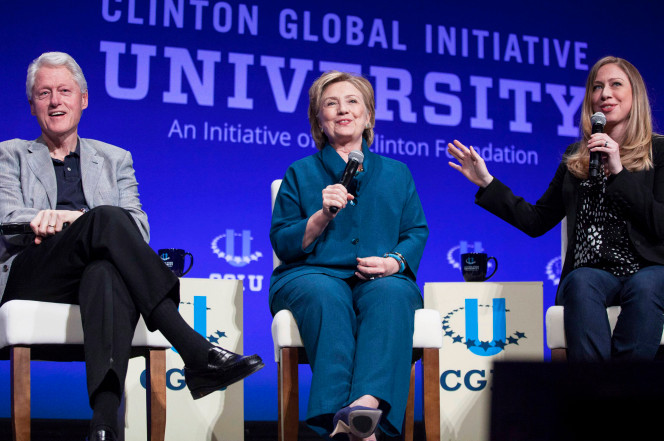Not so far, but that the question arises yet again points to a need for major changes at the foundation now, before the November election.
Bill Clinton created the foundation in 2001 as a vehicle to fund his presidential library. He and his supporters have since raised more than $2 billion and pioneered initiatives ranging from fostering female-owned businesses in Haiti to lowering the cost of H.I.V./AIDS drugs in Africa. As the enterprise sprawled from water treatment to education to climate change, all three Clintons got involved, along with their network of longtime political advisers, former administration officials and business partners.
When Mrs. Clinton became secretary of state, the Obama administrationtried to draw a line between the foundation, particularly its foreign-government sponsors, and her role. The new emails underscore that this effort was at best partly successful. “Pay-to-play” charges by Donald Trump have not been proved. But the emails and previous reporting suggest Mr. Trump has reason to say that while Mrs. Clinton was secretary, it was hard to tell where the foundation ended and the State Department began.
Mrs. Clinton became involved in State Department deals and negotiationsthat also involved foundation donors or board members. She prompted multiple investigations with an arrangement that allowed Huma Abedin, her deputy chief of staff at the State Department and now vice chairwoman of her campaign, to be paid simultaneously by the State Department, the foundation and Teneo, a consulting firm run by Doug Band, the former adviser to Mr. Clinton who helped create the foundation — and who sent emails to Ms. Abedin seeking favors for foundation donors.
The newly disclosed emails show that some foundation donors and friends, like Crown Prince Salman bin Hamad bin al-Khalifa of Bahrain, used foundation channels to seek access to Mrs. Clinton.

When Mrs. Clinton announced her candidacy, the foundation said it would stop taking contributions from foreign governments, except for contributions from Australia, Canada and a handful of European nations. Donna Shalala, the foundation president, says now that if Mrs. Clinton wins, the foundation will stop taking money from any foreign governments, corporations or citizens; American corporations and corporate foundations would also be barred. Contributions would be limited to American citizens, permanent residents and United States-based independent foundations.
Ms. Shalala and her team are examining the organization’s foreign and domestic programs to see which can be hived off and run independently, to avoid potential conflicts. They are consulting with foundation sponsors and partners to see which are equipped to manage various programs. The foundation may keep some domestic programs, such as one for early childhood education and another that addresses community health.
No decisions have been made about the fate or funding of the Clinton Health Access Initiative, a separate, affiliated nonprofit group known as CHAI that has Bill and Chelsea Clinton on its board. The initiative operates exclusively overseas, derives most of its budget from foreign sources and accounts for more than half of the foundation and its affiliates’ combined spending.
Mr. Clinton has said he will resign from the board of the foundation and the CHAI board if Mrs. Clinton wins the presidency. Simply closing the foundation, as even some Democrats recommend, could kill programs helping tens of thousands of people. While that’s unwarranted, the foundation could do much more to distance itself from the foreign and corporate money that risks tainting Mrs. Clinton’s campaign. Its plans to restrict its funding sources only after the election will likely dog Mrs. Clinton.
A wiser course would be to ban contributions from foreign and corporate entities now. If Mrs. Clinton wins, Bill and Chelsea Clinton should both end their operational involvement in the foundation and its affiliates for the duration of her presidency, relinquishing any control over spending, hiring and board appointments.





